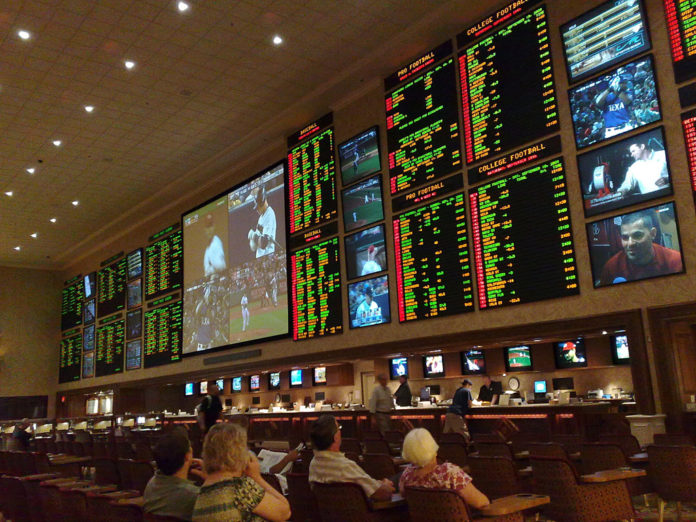Legislative leaders on Wednesday gave the go-head for separate committees to look at sports betting and the effectiveness of the state’s economic development incentives.
The Legislative Coordinating Council authorized committees to start work on sports wagering legislation, a move that sets the stage for a debate on the issue next year.
It also authorized a review of the transparency of the state’s economic development programs, an issue considered last session but that eventually lost momentum.
In a landmark ruling early last month, the U.S. Supreme Court ruled that states could decide whether to allow sports betting, an activity had only been legal in Nevada and three other states.
Sports betting started this month at New Jersey’s Monmouth Park thoroughbred track and the Borgata Casino Hotel & Spa in Atlantic City. At least a dozen states, including Kansas, considered bills this year that would legalize sports betting.
Eilers & Krejcik Gaming, which monitors gambling legislation nationally, predicted that legal sports wagering will be available in 32 states within five years.
Fourteen of those states could have legalized gambling within two years. ESPN analysts pegged Kansas as among the first 22 states to allow sports betting.
Legal sports betting could be worth $7.1 billion to $15.8 billion if it’s authorized nationwide, according to some estimates.
Some estimates, however, suggest that legalized sports betting could net Kansas somewhere between $6 million and $27 million a year in local and state taxes, depending on how high it’s taxed and how widely available sports betting is permitted.
The issue could have appeal next legislative session with the state facing the prospect of finding hundreds of millions of dollars to end litigation over state education funding.
However, lawmakers were only allotted one day instead of the three they requested to study the issue before the next regular session.
“I figured it would take at least three days,” said Republican state Rep. John Barker, chair of the House Federal and State Affairs Committee. “It just makes it a little bit harder.”
Barker and Republican state Sen. Bud Estes, chair of the Senate Federal and State Affairs Committee, want to look at the four sports wagering bills that were introduced last session.
They want to evaluate the best way to regulate sports wagering and how that would work in the context of the state’s current laws on gambling.
The gambling issue is complex and presents a number of issues to examine. They include:
- How much of a cut should major league sports get from legalized sports betting? Last session, one bill would have given the sports leagues a 1 percent take from the money gambled on sports in Kansas. Another would have earmarked 0.25 percent for the sports leagues. A third didn’t include any fee.
- To what extent should sports wagering be allowed on internet sites and mobile apps? There’s a fear that mobile sports wagering wouldn’t be well regulated. Casinos also have a problem with this idea, saying interactive sports gambling should be conducted on interactive platforms run by brick-and-mortar casinos.
- How involved should the Kansas Lottery be in sports wagering? A couple bills in the Legislature this year called for the lottery to oversee sports wagering. One bill would have allowed the lottery to offer sports betting at any facility it operates and through any lottery retailer — such as a gas station — that contracts to offer sports betting.
Barker believes the court decision on schools could give the issue legs next session.
“If we can show what the projected revenue would be, that may be one of the reasons people would want to pass it,” Barker said.
Meanwhile on the economic development front, a joint House-Senate committee was authorized to examine the state’s economic development programs.
It will only be given one day on the issue in contrast to the three days that had been requested.
Republican state Sen. Julia Lynn, chair of the Senate Commerce Committee, requested the review of the state’s economic development incentive programs.
Last year, she pushed legislation calling for a more rigorous review of the state’s economic development incentives but it eventually died.
“It is imperative for there to be greater legislative oversight over economic development policies to ensure there is a continued framework for future economic growth in Kansas,” Lynn wrote in making the case for an interim study.
In an interview, Lynn said she wants to go back and look at a report from the Pew Charitable Trusts that criticized Kansas for lacking a plan to regularly evaluate tax incentives.
The Pew study found the state auditors have frequently studied the state’s tax incentives.
“However, these studies have been the result of ad hoc requests from lawmakers. There is no structure in place to ensure regular and rigorous evaluations of the state’s incentives,” the Pew study concluded.
The Pew study found that Kansas was one of 23 states that were considered trailing in evaluating economic development incentives. Ten states were considered “leading.”
Lynn said she wants to give structure to the economic development programs and establish new criteria that could be used as a basis for creating new ones.
Eilers & Krejci
















